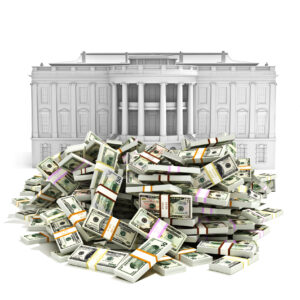The U.S. hit twin milestones recently : federal tax collections set a record for siphoning money out of your pockets, while in the meantime the national debt set a record as well. Oh yes, and inflation—so recently brought to heel by the Democrats via the Inflation Reduction Act!—is soaring as well. Let's look at the numbers. First taxes:
The federal government collected a record $4,408,452,000,000 in total taxes in the first eleven months of fiscal 2022 (October through August), according to the Monthly Treasury Statement. That was up $525,658,170,000—or 13.5 percent--from the then-record $3,882,793,830,000 (in constant August 2022 dollars) that the federal government collected in the first eleven months of fiscal 2021. The record $4,408,452,000,000 in total taxes that the federal government collected in the first eleven months of this fiscal year, included a record $2,404,419,000,000 in individual income taxes.

Bringing all Americans together every April 15.
Now, have a look at the national debt. Please do not confuse this with the deficit, which is how much Washington goes into additional hock each year even as it is mugging you. This, rather, is the total of all the deficits in our nation's history:
America’s gross national debt exceeded $31 trillion for the first time on Tuesday, a grim financial milestone that arrived just as the nation’s long-term fiscal picture has darkened amid rising interest rates. The breach of the threshold, which was revealed in a Treasury Department report, comes at an inopportune moment, as historically low interest rates are being replaced with higher borrowing costs as the Federal Reserve tries to combat rapid inflation. While record levels of government borrowing to fight the pandemic and finance tax cuts were once seen by some policymakers as affordable, those higher rates are making America’s debts more costly over time.
How much is $31 trillion? Written out, that comes to 31,000,000,000,000, or 31 × 1012. A mere one percent of that is $310 billion, which was the federal deficit alone in 2019.
Finally, here are the current inflation numbers, in the wake of the thoroughly dishonest Inflation Reduction Act: "The current rate of inflation in the United States is 8.26% (for the 12 months ending on Aug 31, 2022, down from 8.52% in July)." Some reduction, like saying your house is a little less on fire this month than it was last month. It's still on fire.

Too much is never enough.
The point is by now beyond obvious: with numbers like these, the Republic cannot continue until it gets its fiscal house in order, which will be never. And why should it? In addition to everything else wrong with the Robinette administration—the Afghanistan disaster, the cratered economy, widespread social unrest including soaring violent crime, the literally insane rush to war against Russia in order to protect Biden Inc.'s corrupt family business in the Ukraine—the financial wizards in Washington are also in the grips of a madness known at Modern Monetary Theory, which is the fiscal incarnation of the Left's overall embrace of Marxist Frankfurt School's Critical Theory:
Modern Monetary Theory (MMT) is an economic theory that suggests that the government could simply create more money without consequence as it's the issuer of the currency, according to the Federal Reserve Bank of Richmond. As part of this theory, the thinking is that government deficits and national debt don't matter nearly as much as we think they do.
Instead of relying on tax revenue or borrowing to support federal government spending, according to MMT supporters, the government can simply create more money instead. This is a big departure from how many economists think about government spending and has become a popular alternative theory as discussions about debt and government spending hit the national stage.
This is the current thinking of our government and, when you stop to think about it, has been for decades. One warning sign came early, when the American space program, so proudly having risen to President Kennedy's challenge to put a man on the moon before the end of the 1960s, effectively ceased to exist after December of 1972, with Richard Nixon freshly re-elected in one of the greatest electoral landslides in history. (Spoiler alert: he'd be deposed two years later in America's first political coup.)
As the full effects of the various Sixties' revolutions began to take effect, it was deemed more "moral" to direct our money to social goals, including welfare and the various entitlement programs that took root like kudzu in Washington and gradually, in the name of "helping," choked the life out of the old can-do America and replaced it with gimme America.

"Without a friend."
But the real blow to America's fiscal house—and, more important, its commitment to personal liberty—came just over half a century earlier with the 16th Amendment, proposed in 1909 and ratified in 1913. Proposed by the nascent "progressive" movement during the William Howard Taft presidency, and ratified by the states in February 1913, after the election of Woodrow Wilson (in which the GOP split the vote when Teddy Roosevelt, wanting his old job back, ran on the Bull Moose ticket and cost Taft re-election) but prior to Wilson's inauguration.
"Democratic Party Platforms under the leadership of three-time Presidential candidate William Jennings Bryan, however, consistently included an income tax plank, and the progressive wing of the Republican Party also espoused the concept," notes the National Archives, but conservatives had always managed to squelch it. Until:
In 1909, progressives in Congress again attached a provision for an income tax to a tariff bill. Conservatives, hoping to kill the idea for good, proposed a constitutional amendment enacting such a tax; they believed an amendment would never receive ratification by three-fourths of the states. Much to their surprise, the amendment was ratified by one state legislature after another, and on February 25, 1913, with the certification by Secretary of State Philander C. Knox, the 16th amendment took effect.
Yet in 1913, due to generous exemptions and deductions, less than 1 percent of the population paid income taxes at the rate of only 1 percent of net income.
That was then, this is now. What seemed, or was made to seem (which is more like it) a good idea at the time has turned out to be one of the four principal "progressive" death-blows against the original Constitution. (We'll consider the other three in subsequent columns.) What has happened since the U.S. abandoned its prior reliance on excise duties and tariffs, which served the nation well for the first 140 years of its existence, is that the Congress, with the now-infinite resources of the American taxpayer and the Treasury's printing presses, has entirely abandoned all fiscal propriety—the inevitable consequences of an income, as opposed to a tax on goods and services.
To take just one example, in 1991, Lowell Weicker, the Republican governor of Connecticut, instituted a "temporary" income tax in a state that famously had had none. Pitched as "middle-class tax relief" that would make the rich "pay their fair share," the tax remains with us still:
Weicker pitched a sunset provision for state income tax multiple times in 1991, and the 1992 budget created a tax commission that “could conceivably ‘sunset’ the income tax in 1993,” according to the Boston Globe. According to a July 12 article in the Hartford Courant, Weicker’s budget “includes one unexpected wrinkle – a proposal to have the entire revenue structure expire in 1994 unless readopted.” Weicker used the sunset provision to garner support among unwilling Connecticut legislators as 1991’s budget battle stretched into the summer months.
In a televised speech on July 17, 1991, Weicker offered to end the tax in 1993, which would have made the income tax essentially a one-year deal to boost state revenue. According to the New York Times, Weicker “offered what he called a ‘fair compromise’ to automatically end the income tax in December 1993.”

Welcome to Connecticut.
Since then, Connecticut (where I live when I'm in the U.S., so I speak from first-hand experience) jumped from the flat-tax frying pan into the "progressive"-tax fire: a small state, once known as the Land of Steady Habits, now boasts an outsized debt of $35 billion, only recently ameliorated by a $4 billion surplus that will go (maybe) toward paying down the massive I.O.U.s the Nutmeg State has long-ago promised to fund pensions for... retired state employees and teachers. That's right, the current residents will get absolutely nothing, because nothing is too good for retirees who no longer contribute to either the economy or the commonweal. Pass an income tax, get disaster, whether at the federal or state level.
While Connecticut lawmakers sold the progressive tax as a way to provide middle-class tax relief and reduce property taxes, neither occurred. Instead, everyday taxpayers have been hit with recurring income and property tax hikes. The typical Connecticut household has seen its income tax rates increase more than 13 percent since 1999. At the same time, property tax burdens (property taxes as a share of income) have risen by more than 35 percent. Making matters even worse, the policy change cost the state’s economy more than $10 billion and 360,000 jobs, ultimately shrinking the labor force by an estimated 362,000 workers.
The Connecticut progressive income tax failed to fix state finances. In the wake of its progressive income tax experiment, Connecticut has continually raised taxes on the middle class, has a chronic outmigration problem, and finds itself in a financial situation that is just as dire as Illinois’. Connecticut has run state budget deficits in 12 of the past 15 years, and is holding more debt per capita than almost any other state.
Diabolically, the "progressive" Left has long pitched "progressive" income taxes as an act of enforced Christian charity, even though few of them are Christians, either of the professed or practicing variety. The income tax instead has proven to be a mechanism by which the wealthy—especially those benefitting from generational wealth, and thus have no "earned" income to report to the IRS—continue to thrive while the middle class, which has its money sucked out of its pocket via "withholding" (1943-), can never accumulate enough to move up. It's the famous Fox Butterfield Effect, in which an apparent contradiction is more properly understood as cause and effect.
The truth is simple: when you have an income tax, you also get massive, snowballing debt. One of the first items on the DeSantis administration's order of business in January 2025 should be a move to repeal the 16th amendment as he cuts the size of government and abolishes any number of useless federal departments, reforms the franchise—and gives Americans back their economic freedom.
Next up on the chopping block: the 17th Amendment.
All departments, agencies, and branches of the government that have debt, must cut spending by 10%. Each year that the debt continues, the same amount of money will be reduced from their budget.
Not "no increases", but actual cuts.
ALL parts of government. Including Entitlements, which will not see Cost of Living Adjustments. And, all entitlements will be cut 5% for each year the debt continues.
And, before you call me a heartless granny-killer, I should mention that I'm 71 and receive Social Security. So, yes, this would hurt me, too.
How about taxing "nonprofits" that funnel most of their money to non-direct services, particularly when they pay their board and staffs large salaries and perks.
In other words, the Salvation Army could keep their money without being taxed, but the universities' endowment funds, cultural foundations that use their money to pay high salaries to other Leftists, and most of the Soros/other Leftists foundations would find out why permitting the government to run up debt is a bad idea.
Won't solve everything, but will be a good start.
I remember my dad telling me of his pre-WWII tax payment, which was around $50 for the year. He paid, but he also complained, as did many of the other people paying that tax.
After the sudden influx of servicemen into the military, government started withholding of tax (and Social Security) money directly from employee's checks. Dad pointed out that they never could have collected that much using the old yearly payment method. But, by breaking down the amount into weekly/monthly paychecks, people got used to the grab on their money. It made raising taxes relatively easy.
I’m on board in principle. But how do we pay off that 31 trillion debt with excise duties and tariffs? I need to see more of a plan than just “repeal the 16th amendment”.
Good idea. And as long as we're dreaming, I'd like a pony, too.
Repeal 16th -- agreed. As it now stands, SCOTUS is one of the branches of the federal government. That makes the federal government a judge in its own cause. Not acceptable. Perhaps we need a new amendment allowing 2/3rds of the state to overturn a SCOTUS decision.
Congress can do that with a wave of a pen and strip the Court of everything but its constitutionally mandated powers, which are very few. One thing that's NOT Constitution is "Marbury v. Madison," so that's a good place to start.
I would also repeal the 17th Amendment. Having two popularly elected bodies has fueled the growth of the federal government all out of proportion to its intended task.
Regrettably, I'm not sure that the repeal of 16A would accomplish anything.
Many people have the mistaken notion that 16A somehow 'legalizes' an income tax. That's simply wrong. Income taxes have always been legal for the federal government in the USA. The problem (for Congress) was (and is) that an income tax is a direct tax, and the Constitution states (Article 1, Section 9) that all direct taxes levied by the federal government must be spent (apportioned) proportionally to where they were raised. The importance of the 16th Amendment is NOT in the 1st part: 'The Congress shall have power to lay and collect taxes on incomes, from whatever source derived.....', which merely repeats the obvious, but in the 2cd part: '.....without apportionment among the several States, and without regard to any census or enumeration'. This is the language that makes an income tax so valuable to Congress; they can spend the money raised without the direct tax limitation.
Since money is fungible, I suspect (with the advent of modern computing power) that a repeal of 16A would not eliminate the federal income tax. The machines could likely allocate such tax revenue sufficiently to comply with the Constitution.
An “income tax” insofar as it is a tax on wages, is tantamount to slavery; it is in fact immoral. For someone to have a higher, prior claim to the fruits of your labor than you, is the essence of slavery. However, the repeal of the 16th Amendment will never happen; at least 90% of the population would oppose it because they directly or indirectly benefit from it, but any benefits from ending it are too nebulous. And plus, as long as everyone is equally miserable, well…
How about we eliminate employer withholding of taxes? No one thinks their employer should be responsible for their own mortgage or rent payment, car payment, utility payment, etc., so why their bill to the government? And why should the employer be forced to act as a tax collector?
It's not the taxing that is the problem. It's the SPENDING. Cut the taxes without addressing the spending MAY work at the state level but at the national level, where the government has the power to borrow much more broadly even to the point of simply printing the money, and you have accomplished nothing. It's a distraction that appeals/sells to conservatives..."conservatives" but does not put a dent in the growth and thus burden of the government on the productive elements of society.
Weicker's CT income tax was propsed to do away with a 14% tax on dividends. Weicker was one of the principal heirs to the Squibb fortune, as in the drug company. I worked out with available public figures of how much he spent on his own campaign vs. his tax savings with that 14% divdends tax abolished now replaced by a much lower tax on all income by the time he left office after one term he had saved enough to more than cover his expense in running for Governor. Mass. voters are facing a referendum to put a millionaires' tax into the text of our notoriously difficult to amend Mass. Constitution. There is NO indexing to inflation in the text--which means with Bidenflation tooling along within a few years most people in Mass. would be paying at the millionaires' rate.
Decades ago Maine adopting a steeply-progressive income tax decades ago and NEVER indexed it to inflation. A single person making only $21,000 is at the top rate of 8.5%; a married couple no kids hits that 8.5% tax rate with a gross income before any deductions of only $35,000. Bracket creep--that magic of the Graduated/Progressive Income Tax!
The point of the article is to take away the economic levers used by the government not add to them.
Besides we’ll spend more on Halloween candy this year than we do on political campaigns as always happens.
It’s a hoary argument to limit how much is spent on campaigns. Eliminate the 16th and then the 17th if you really want to see more localized elections.
I doubt Lee, Cruz, Paul et al would be down with that however.
Michael, I hope that in addition to the 17th Amendment, one of your essays addresses the "borrowing" clauses in the Constitution. As I understand it, the Constitution envisioned Congress approving borrowing on a case-by-case basis for specific purposes -- wars, national construction projects, etc. But the progressives, in combination with Congress' institutional abrogation of authority and responsibility, thought they could substitute a debt ceiling and achieve two contradictory aims. They could both yield to and discipline the executive branch and not have to deal with pesky and difficult decisions. This opened borrowing to fund general government operations as opposed to specific purposes and the debt ceiling votes have proven 100% ineffective and reversing the "fait accompli" through government shutdowns.
Quit the half measures: repeal the 19th.
Can we get someone to notice that the 10th Amendment IS RIGHT THERE IN THE ORIGINAL BILL OF RIGHTS?!?
Easily 9/10ths of what the Federal Government does these days is in direct violation of the 10th Amendment, and the USSC must revisit that disaster of a decision Wickard v Filburn.
MMT does not stipulate that the federal government can "create more money without consequences". In fact MMT is very clear that inflation, not solvency is the limiting factor on federal government spending.
Let's do this!
https://docs.google.com/document/d/1LIr9h4h4kpUggGNrm9qq033B3EbdKhMECURtjPMkHXE/edit?usp=drivesdk
SIMPLE FIX to the Senate BUYING!! Pass Campaign FUNDING Laws to return POLITICAL Contributions to the PEOPLE AFFECTED by the office!! City offices = CITY residents! County offices = COUNTY residents! Congressional Districts = DISTRICT residents! State = STATE residents! NO OUTSIDERS!! AND for good (or GREAT) measure, outlaw POLITICAL PACS! Then limit Contributions to what the AVERAGE Americans can afford - probably no more then $250 PER YEAR TOTAL! The LEFT is ALL about EQUITY so this would be a move in that direction! Have STRICT and MANDATORY Punishments for VIOLATORS! Put the politicians back on the streets, knocking on doors, and since the emergence of Bidenism, NO KISSING BABIES!
Really looking forward to reading how we need to dump the 17th amendment. I have been saying this for years. The Senate was supposed to represent the states; now there is no voice for the states at the federal level.
Coming right up.